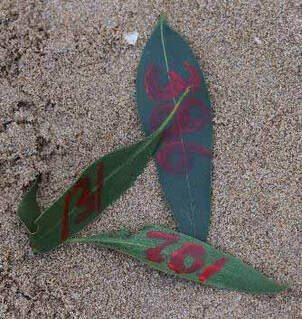 Each numbered gum leaf at Solidarity in Surf represented one of the 437 Aboriginal people who have died in police custody since 1991. Photo: Geoff Ellis
Each numbered gum leaf at Solidarity in Surf represented one of the 437 Aboriginal people who have died in police custody since 1991. Photo: Geoff Ellis
“The most profound and powerful experience I have had in 30 years” is how Bunurong/Boon Wurrung traditional owner Sonia Weston described the Bass Coast Solidarity in Surf Black Lives Matter rally at Eagles Nest beach on June 7.
Traditional owners and their allies gathered at sunrise at the beach, between Cape Paterson and Inverloch, to remember Aboriginal deaths in custody and support the Indigenous cause. Sonia’s own life has been affected through her extended family. “Distant cousins are as close to us as immediate family, so we feel the pain deeply,” she said.
Since the Royal Commission into Aboriginal Deaths in Custody in 1991, 437 men and women have died in lock-up, and no one has ever been convicted of murder or even of manslaughter in relation to the deaths. Many of the victims had not even been charged, let alone sentenced for offences. Filmed evidence shows brutal treatment, neglect, and medical negligence, causing dreadful injuries, worsened medical conditions and death, but nothing is done. The behaviour of those in authority is allowed to continue.
Is it any wonder that people, Indigenous and non-Indigenous, are marching in the streets?
The Bass Coast South Gippsland Reconciliation Group stands in solidarity with Sonia and the 800-strong Aboriginal community in our two shires. The group is committed to spreading awareness of the issues and to taking action.
An important aspect of this work is our lobbying for the acceptance of The Uluru Statement from the Heart and the enactment of its proposals. The Uluru Statement was a consensus document, drawn up at Uluru three years ago after the most widespread consultation ever of Aboriginal people across Australia, conducted by Aboriginal people. Sadly, the Uluru Statement was summarily dismissed in October 2017 by then Prime Minister Malcolm Turnbull, even though the process had been initiated by his government, with bipartisan support.
The Statement from the Heart calls for an Aboriginal voice to Parliament enshrined in the Constitution; for treaty to acknowledge prior ownership of the land and self-determination over their own destinies; and a truth-telling commission to educate people about the past and hopefully to bring about healing through the recognition of past wrongs. Australia is the only country in the Commonwealth that has no treaty with its First Peoples.
We note that the National Aboriginal Community-Controlled Health Organisations (NACCHO) has managed the best response in Australia to the COVID outbreak. They have had no deaths and fewer than average cases across the whole of Australia, despite initial fears that if it got into remote communities it would run rampant. The one difference is that they were able to control things themselves. They had self-determination. NACCHO represents the communities and they can communicate immediately and effectively. There was no time for politics and bureaucracy to interfere. Communities got on with it because they knew how.
It is clear that First Nations communities also know how to manage other areas of their lives, such as education, land care and youth justice. They just need to be resourced by government. They don’t need to be told what to do and how to do it, which is disempowering and destructive. Self-determination is the best policy because it works; bureaucratic intervention and ignoring Aboriginal voices does not.
The Bass Coast South Gippsland Reconciliation Group meets every month, lately by Zoom, to educate ourselves about Aboriginal culture and how we can walk alongside our Aboriginal Community members. You can find us on Facebook.
Marg Lynn is a member of the Bass Coast South Gippsland Reconciliation Group.